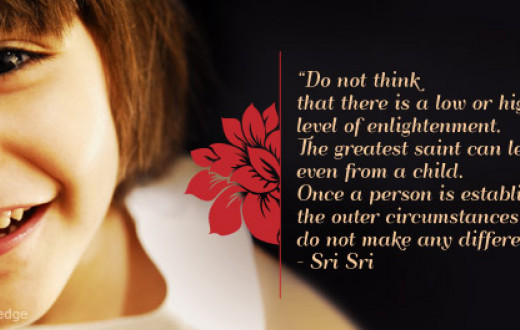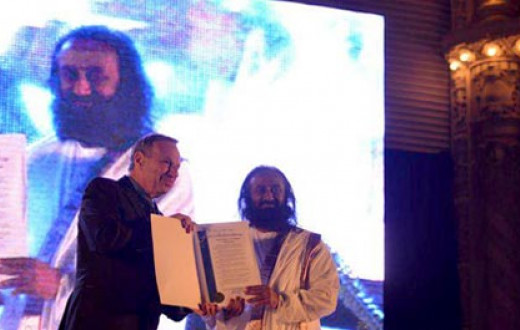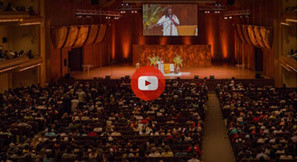
(Below is a continuation of the post An Unwritten Law)
We need to bring unity in diversity. Terrorism is just lack a of education in spirituality. the root cause is that and it has to be nipped at the bud. Schools and colleges should have a broad spectrum of knowledge. Every child should know a little bit about all the religions of the world so that they don’t grow up thinking that only they go to heaven and everybody else goes to hell.
When people think that others are infidels, others are non-believers and only they have the right over God and God’s word, then that becomes a problem for the world. People should know that every word and every sound belongs to God. Multi-cultural, multi-religious education is a must in the world. I have been pushing for it. I have been talking to so many people.
Our teachers are working tirelessly in Iraq, in Kurdistan, and in Pakistan. In Pakistan our teachers are working very hard to educate people. Of course, we face opposition.
It was going so well in Pakistan, hundreds of people were taking the course. But suddenly some people were not happy with it and so they tried to stop it. Yet see the enthusiasm of the people, they say, ‘No, we will still do it.’
I told them to wait for a little while and then continue our work. None of the teachers are saying, ‘No, we are not going to work because we got into a problem'. Instead they said, ‘No we will do it.’
The same happened in Buddha’s time. Some of Buddha’s very close disciples ganged up and went behind the hill and pushed a big boulder towards him. The boulder stopped just inches in front of Buddha. All the others were so upset but Buddha still smiled and kept quiet. He said, 'It was some karma that had to be finished’. This is Sattvik Dritti.
Similarly, in Pakistan we had a beautiful center outside Islamabad where about 100-150 people could go every weekend and meditate. Usually there is an advance course there every weekend, but this one particular weekend they talked to me about it and I told them to do it in at another place. I also had no logic to tell them to do it somewhere else when we have our own place. But I just did and they shifted the venue. They did the course in a hotel.
On Saturday, eight gunmen came there in two cars and they set fire to the whole center. Our center was burnt down to the ground. They destroyed the whole center.
'We are so lucky that nothing happened to the people and nothing happened to the guard', this is what they tell me. This is Sattvik Dritti.
Instead of saying, ‘Everything got burned down.’ They said, ‘Nothing happened to the guard.’
'Even in disaster there is something good that has happened, something that has moved us forward', this is a sattvik doer. If everything is collapsing, take it as an opportunity and say, ‘We will move forward. We will take this as an opportunity to create something new'.
When a relationship breaks down, you should see how people get so devastated as though they cannot exist anymore. At that time knowledge gives them the strength to move on.
The other day when I was in California somebody said, ‘I am devastated, my relationship ended. We were together for so many years and he left me'.
I told her, ‘My dear, there are seven billion people on the planet, and a third of them are of a marriageable age. Don’t worry, you will only get a better person. Move on!’
Just that one word of encouragement and she lit up and got the confidence, ‘Yes, so what if he left me, he does not know my worth, he is a fool'.
So just move on! You don’t have to say bad things and call him a rogue and a cheater. If you call him a cheater you are going to be in more trouble. Do you see what I am saying? By trouble I mean, you are going to get more upset. If you keep saying, 'You are a cheater, you cheated me, you cheated me', the other can say, 'Well, you are so dumb to get cheated. Why don’t you look inside?'
So you cannot correct the other person, but you can definitely correct yourself. Think that he is dumb and he is not worthy of me and say bye. Then you can move on with a fresh heart, with a lighter heart, and with a happier heart, instead of cribbing and calling him a cheater and all these things. Otherwise he has left you and gone but you have not left him, you have put him in your head and spoiled the whole head.
So we can change our attitude to events, our attitude towards people, and our vision, and this is what the Bhagavad Gita teaches us.
Lord Krishna says, 'With these eyes you cannot see the Divinity in the world. I’ll give you special eyes to see the vishwaroopa, to see the play of the divinity'.
The knowledge is so amazing, so uplifting! No superlative is enough to even say how beautiful this is. When you go chapter by chapter, it is so interesting.
Yes, because sometimes the seeking is not on a conscious level, but deep inside it is there.
Why are you here in the first place? You are here because inside the soul wants something. It wants to connect with itself. So it is there inherently, you don’t have to consciously say, ‘I want to know myself, I want to know myself!’ If you keep saying this, you’ll become crazy. In our language we call such people the Blue Stars. They are good people but not so grounded.
If you don’t consciously have the feeling, ‘I want to know who I am’, doesn’t matter. Know that there is a seeking and that’s how you’re enjoying the knowledge, the meditation and this path. It is there in everybody but sometimes it gets overshadowed, and sometimes it becomes a little more obvious. It doesn’t have to be at an intellectual level but it is there on the existential level.
Our teachers are working tirelessly in Iraq, in Kurdistan, and in Pakistan. In Pakistan our teachers are working very hard to educate people. Of course, we face opposition.
It was going so well in Pakistan, hundreds of people were taking the course. But suddenly some people were not happy with it and so they tried to stop it. Yet see the enthusiasm of the people, they say, ‘No, we will still do it.’
I told them to wait for a little while and then continue our work. None of the teachers are saying, ‘No, we are not going to work because we got into a problem'. Instead they said, ‘No we will do it.’
You can analyze your mind, your intellect, and your whole system to see whether it is Sattvik, Rajasik or Tamasik. This knowledge is from the Bhagavad Gita.
Bhagavad Gita gives you that much needed bridge between the inner (world) and the outer (world): How you can be successful in the world and how you can be successful in this knowledge of the self as well. It has all that one needs at all the different times of life.
Bhagavad Gita starts from Vishaada Yoga, which means the Yoga of Regret. Many people are stuck there (in feelings of regretful). There are 18 steps in everybody’s life, and you can see where you are stuck (with the help of the Bhagavad Gita). If you’re stuck in regret, that’s when the Guru comes and say, ‘Come on, wake up! Drop the regret'.
Arjuna was talking like an intelligent and clever person, one who knows it all. The first thing Lord Krishna tells him is, ‘You speak like someone who knows everything but when I see you, you look like a wreck.’ That’s how he wakes him up from that state of remorse, sadness and depression, and then he pushes him step by step into knowing the knowledge, and then instills action.
The Bhagavad Gita is not just for one person sometime in the past. It applies to everyone’s lives. So you first start with uplifting yourself, and then what do you do? You do Karma Yoga, you do action. Then you don’t just get stuck in action, you move on to knowledge, and from knowledge you go to meditation (dhyana yoga), and then you go beyond, i.e., love and devotion.
All aspects of live has been attended there, including food: what is sattvik food, what is rajasik food, and what is tamasik food. What are the kind of qualities; there are divine qualities and demonic qualities. There is a one whole chapter on divine qualities and demonic qualities.
First he speaks of the divine qualities, and then he says, 'Now listen to me on the demonic qualities'.
He says, ‘Mind you, you already have good qualities. That is why you are even listening to this.’
Krishna uplifts Arjuna at every position, encourages him and helps him to come out of his stupidity. In the whole Gita he said only once, ‘You talk like a scholar, someone who knows it all, but look at you! You’re shivering. Your talk and your behavior doesn’t match'. This is the only one time that he gives Arjuna a big hit, but later on he only keep uplifting him and tells him, ‘You are great.’ He pulls up the greatness in him. That is where the master pull him up step by step.
Arjuna also had lots of doubts and he asked so many questions. He tell Krishna, 'I know that nobody else can answer these questions. Krishna, only you can answer my questions. I am loaded with this one big questions: that of the mind. This mind is so difficult to control, it is like the wind. I cannot keep my mind still'.
Arjuna had all the difficulties that you have. Any difficulty that anybody can have at any point of time, Arjuna has put forward all those difficulties.
He says, 'I cannot control my emotions. I cannot control my mind, what do I do?'
Then he tells him, ‘I know it is difficult but it is not impossible. Take this step and this step. So step by step Krishna leads Arjuna into a position where he feels complete.














































